Concerning Cassini
At the beginning of the year, I saw a tweet by my friend Ben Ramsey, where he quoted Carolyn Porco's tweet requesting help saving CICLOPS, the web site of the Cassini Imaging Central Laboratory for Operations, which was under threat of disappearing off the internet.
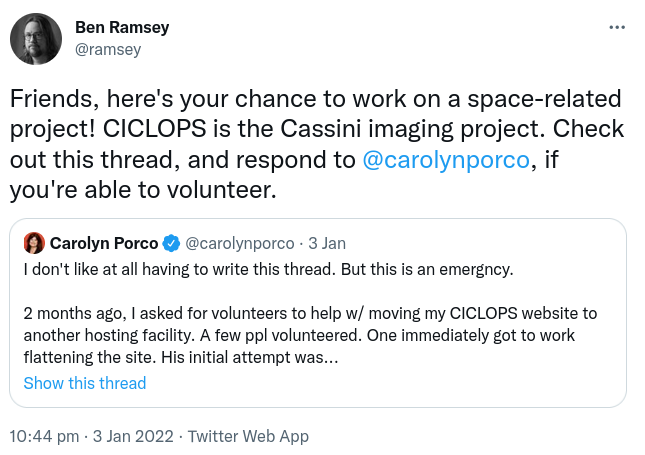
I have been enthusiastic about space since I was in my early teens, with at some point expressing the interest to be an astronaut. I never pursued that, but I have continued to express great interest in space exploration.
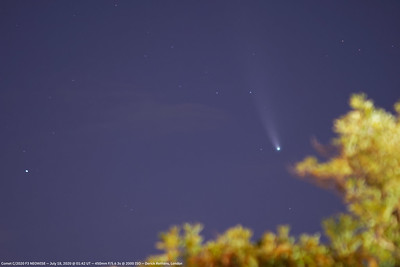
I have dabbled in some astrophotography, having some mediocre successes with last year's comet NEOWISE. I never got into the field of astronomy nor photography. Instead I started doing web technology, including PHP, which how I know Ben.
Tech is cool too, but I always hoped to do something for, and with, space exploration.
So when I saw Ben's tweet, I thought this would be something I could help with, so I reached out to Carolyn via DM.
The task at hand at that time seemed to create a static copy of the existing CICLOPS website, but after some twitter to-and-fro, an additional ask seemed to be to create a functionally equivalent static search.
Over night, Ben had mirrored the CICLOPS website with wget and I took his copy to make some improvements, and started doing some research into how to do a static search. I had quite some experience with SOLR as well as full text search in general and with MongoDB. The problem was that all of these needed something to run on, which would create complications and costs, beyond just hosting a static site on something like S3.
After some research through DuckDuckGo, I found a neat JavaScript library, called Lunr, which looked perfect for a quick-and-dirty static search engine. Like most other more complex search engines, Lunr creates a reverse index that maps every word back to a location in a document, with some clever maths to rank more specific words higher in the results.
I started writing a script to extract the text from the crawled CICLOPS site to pick out the actual descriptions of each post and media item, and then made that index into Lunr's full text search index. With that, I set up a static site on S3 as a demo. This demo could have become a crude final result, and would have saved all the original content and images of the Cassini space probe.
That was the easy part.
In the course of several weeks, I worked with Ben, Carolyn, Jakub and David to refine the search index, split it into several different categories (the one with the images is my favourite!), added pagination, phrase searching, and a ton of other tweaks to make the static CICLOPS site an excellent simile of the original dynamic site, which turned out to be written in PHP!
To be honest, this took a lot more work than I originally had thought, with many hours spend on my side, all in the name of science.
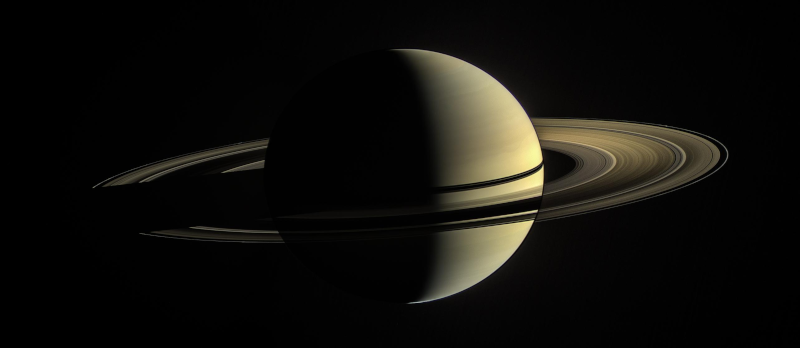
The resulting site is something to be proud of. The search is faster and more capable: look at the instructions! I finally managed to do something space related—and that all for my favourite planet!
I would explore you to have a search through the rich set of images that is available on the CICLOPS site, and let me know what's your favourite!
Life Line
Created a bench and a crossing
Created 2 benches and a crossing; Updated 5 cushions, a post_box, and a crossing
Created a crossing; Updated a cushion
If you were wondering whether the www.php.net & downloads.php.net services weren't responding very well in the last 6 hours — thousands of requests/sec to https://www.php.net/ 's root.
The server's load was 720, didn't die, but CDN connections to it timed out.
Now there is a caching strategy in place for a selected set of resources.
Updated a bench
Created 3 benches; Updated 10 benches
Updated a bench
Updated a bus_stop
Created a bench and a waste_basket; Updated 6 bus_stops and a crossing
Created 2 waste_baskets and a recycling; Updated 2 bicycle_parkings and a recycling
Updated a fast_food, a funeral_directors shop, and 2 other objects; Confirmed a fast_food and a hairdresser shop
Created an information; Updated 3 benches and 2 waste_baskets
Updated 2 benches and a waste_basket
Updated a bench
Created a waste_basket and an information
Created a waste_basket
I hiked 18.0km in 4h1m52s
I walked 1.4km in 17m19s
I walked 4.5km in 1h21m49s
I just made and ate, a bowl full of bacon fried Brussels Sprouts. Not under duress, and out of my own free will.
Added new residential building
Created a hairdresser shop; Confirmed a convenience shop and a dry_cleaning shop
Created a building_materials shop, a vacant shop, and 4 other objects; Confirmed a hairdresser shop, a cafe, and 2 other objects
I walked 8.3km in 1h33m44s



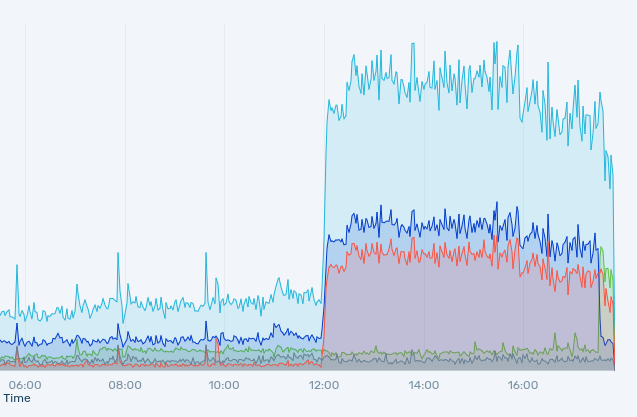
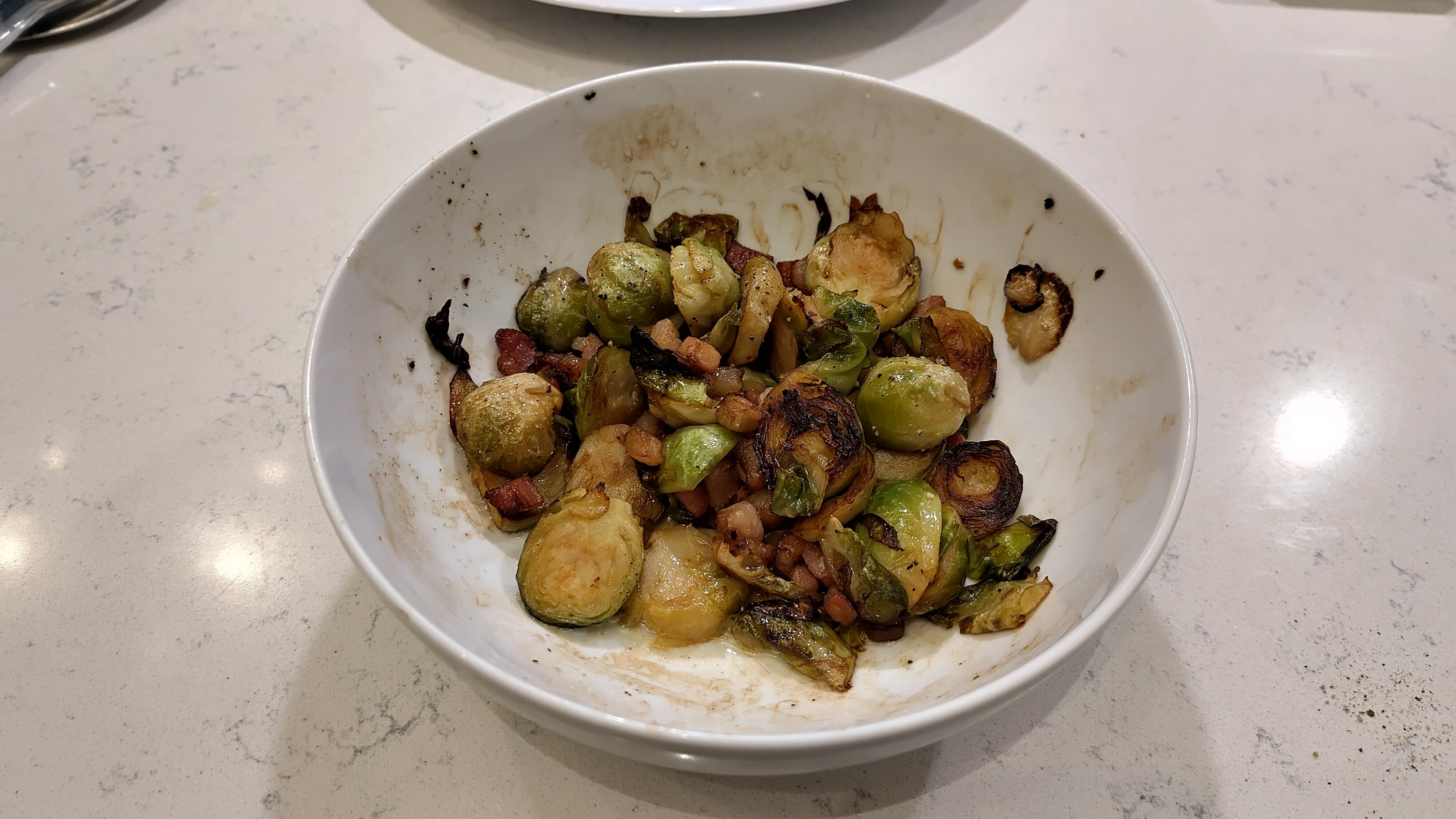
Shortlink
This article has a short URL available: https://drck.me/ciclops-h28